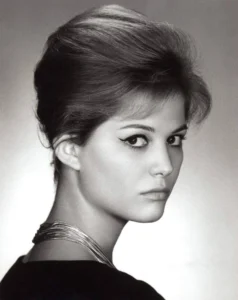 Claudia Cardinale: A Life Lived in Cinema
Claudia Cardinale: A Life Lived in Cinema
Claudia Cardinale was an icon of European—and especially Italian—cinema. Her passing on September 23, 2025, at the age of 87, marked the end of an era. She died in Nemours, France, surrounded by her children, after a long illness. AP News+2euronews+2
Her death was met with tributes from around the world: she was hailed not only for her beauty and screen presence, but for her artistic contributions and her role as a symbol of freedom, strength, and elegance. EW.com+3ANSA.it+3ANSA.it+3
Early Life and Beginnings
-
Birth and family background: Cardinale was born Claude Joséphine Rose Cardinale on April 15, 1938, in Tunis, which was then under French protection. Her family was of Sicilian origin. Vanity Fair Italia+2Sky TG24+2
-
Childhood and influences: Growing up between cultures—Italian, French, Tunisian—she was exposed to multiple languages and artistic traditions. Her early ambition wasn’t to become an actress; she once said she dreamed of being an explorer. iO Donna+2Vanity Fair Italia+2
-
Entry into film world: The turning point was in 1957, when she won a beauty contest in Tunis (the “Most Beautiful Italian in Tunisia”) without even entering. The prize included a trip to the Venice Film Festival. Her look, the photographers, the buzz—suddenly she was noticed by filmmakers. Reuters+3Vanity Fair Italia+3Sky TG24+3
-
Personal challenges early on: At a young age she experienced serious hardships. According to reports, she became pregnant as a teenager under traumatic circumstances and kept that private for many years. Her son Patrick was born in London, and for a long time he was publicly presented as her younger brother. la Repubblica+3Reuters+3iO Donna+3

Rise to Stardom
-
First film work: After returning from Venice and being offered a contract, she began acting in Italian cinema in the late 1950s. Some of her early films include I soliti ignoti (“Big Deal on Madonna Street”) under Mario Monicelli. EW.com+3la Repubblica+3Sky TG24+3
-
Key breakthrough roles:
-
Il bell’Antonio (1960) by Mauro Bolognini. iO Donna+1
-
La ragazza con la valigia (The Girl With a Suitcase) (1961) by Valerio Zurlini. These parts showed her ability to go beyond being merely a pretty face. iO Donna+1
-
-
Defining year — 1963: She had two of her most famous roles:
-
Federico Fellini’s 8½, where she played a kind of alluring presence, almost a dream‐figure, opposite Marcello Mastroianni. EW.com+2The Washington Post+2
-
Luchino Visconti’s Il Gattopardo (The Leopard), in which she was Angelica, a character of sensuality and intelligence in a changing Sicily. ANSA.it+2la Repubblica+2
-
These two films cemented her status as a major figure in European art cinema. Her presence in both works, at the same time, speaks to her demand, versatility, and the way she could move between styles: from Fellini’s introspective surrealism to Visconti’s historical, political sweep. EW.com+2la Repubblica+2
Career Highlights and Filmography
Over her long career, Cardinale appeared in over 150 films and television productions. la Repubblica+2AP News+2
Here are some of her most memorable films, roles, and collaborations:
| Film | Year | Role / Director | Why it mattered |
|---|---|---|---|
| I soliti ignoti (Big Deal on Madonna Street) | 1958 | Early Italian comedy with Mario Monicelli | Her film debut, gaining visibility. la Repubblica+1 |
| Un maledetto imbroglio (1959) | 1959 | Supporting drama, with Pierre Germi | Showcased more dramatic acting, helped develop her craft. la Repubblica+1 |
| Il bell’Antonio (The Hand of the Past) | 1960 | Mauro Bolognini | Complex character, more mature acting. iO Donna+1 |
| La ragazza con la valigia (The Girl with a Suitcase) | 1961 | Valerio Zurlini | Emotional depth; highlighted her ability to carry weighty roles. iO Donna |
| Cartouche | 1962 | Jean-Paul Belmondo film | Broader European appeal; light adventure/comedy. la Repubblica+1 |
| 8½ | 1963 | Federico Fellini | One of the masterpieces of world cinema; her portrayal had a dreamlike quality. EW.com+2ANSA.it+2 |
| Il Gattopardo (The Leopard) | 1963 | Luchino Visconti | Historical sweep; capturing a changing Italy. ANSA.it+2The Washington Post+2 |
| The Pink Panther | 1963 | Blake Edwards | More international/Hollywood crossover; showed versatility in comedy. EW.com+2ANSA.it+2 |
| C’era una volta il West (Once Upon a Time in the West) | 1968 | Sergio Leone | A landmark western; she plays Jill McBain, a central figure. AP News+2ANSA.it+2 |
| The Red Tent (1969) | 1969 | Epic with Sean Connery | Ambitious international production. The Washington Post+1 |
| La pelle (The Skin) | 1981 | Liliana Cavani | More serious, challenging roles, reflecting maturity and moral complexity. la Repubblica+1 |
| Fitzcarraldo | 1982 | Werner Herzog | Strong, adventurous project; difficult shoot; her performance remembered. The Times+1 |
| La storia (1986) | 1986 | Luigi Comencini | Based on Elsa Morante novel; epic and dramatic. Wikipedia+1 |
These are only a sampling; there are many more in later decades: she continued working through the 1990s, 2000s and even into the 2010s and early 2020s. EW.com+2Vanity Fair Italia+2
Personal Life, Relationships, and Challenges
Her private life was often intertwined with her career, sometimes in difficult ways.
-
Motherhood and early trauma: As noted, she had a son Patrick from a rape when she was quite young, and because of societal norms the child was presented publicly as her brother for many years. She carried this personal burden quietly while building her career. Reuters+2iO Donna+2
-
Relationships with film producers / partners: Franco Cristaldi was an important figure in her career, sometimes supportive, sometimes controlling. Later, she had a long partnership with director Pasquale Squitieri, with whom she had a daughter. She never remarried after an annulled marriage with Cristaldi. Reuters+3iO Donna+3la Repubblica+3
-
Cultural identity: Having grown up in Tunisia, speaking French, Italian (Sicilian dialect) and being of Sicilian roots, Cardinale carried a Mediterranean identity. Interestingly, early in her Italian film career, her voice was often dubbed because she didn’t yet have perfect Italian. Reuters+1
-
Public persona: She projected a mixture of glamour, strength, sensuality, but also shyness and modesty in various interviews. She refused to be typecast, and was vocal about wanting her roles to have depth. Vanity Fair Italia+2The Washington Post+2
Awards, Honors, and Recognition
Over decades she received many awards and honors, recognizing both her artistic merit and her contribution to cinema.
-
Leone d’oro alla carriera (Golden Lion for Lifetime Achievement) at the Venice Film Festival in 1993. Sky TG24+2EW.com+2
-
Berlinale honorary award (Golden Bear) in 2002. Reuters+2la Repubblica+2
-
Multiple David di Donatello and Nastri d’argento among Italian film awards. la Repubblica+1
Her film roles (both classic and later ones) are regularly studied in film history: Visconti, Fellini, Leone, as well as Italian dramatic and genre filmmakers. Her enduring presence in cinema festivals and retrospectives speaks to her respect among peers and critics. Vanity Fair Italia+1
Later Years
Even as the cinema landscape changed, Cardinale continued to work. She appeared in roles in her later life that often engaged with complex themes—memory, aging, identity—and worked with younger filmmakers. EW.com+2Vanity Fair Italia+2
She lived in France for many years (Nemours, near Paris). Her health had been declining. euronews+1
Legacy and Impact
Claudia Cardinale was more than just a beautiful actress; she represented a particular blend of style, competence, and inner life. Her work helped define post-war Italian cinema, but she also crossed over into international film, showing versatility across genres—drama, epic, comedy, westerns, etc.
She inspired generations of actors, and her characters often embodied complexity: sensuality + strength; beauty + autonomy. Even her early roles where she played young women conflicted between private pain and public expectations resonate strongly today.
Her death is being mourned not just in Italy, but in France, Tunisia, and globally. She is seen as one of the last of the golden age of Italian cinema superstars. ANSA.it+2la Repubblica+2
A Filmography in Brief: Selected Notable Films
To offer more perspective, here is a more thorough list of important films she starred in, showing her range:
-
I soliti ignoti (Big Deal on Madonna Street) – 1958
-
Un maledetto imbroglio – 1959
-
Il bell’Antonio – 1960
-
La ragazza con la valigia – 1961
-
Cartouche – 1962
-
8½ – 1963
-
Il Gattopardo (The Leopard) – 1963
-
The Pink Panther – 1963
-
C’era una volta il West (Once Upon a Time in the West) – 1968
-
The Red Tent – 1969
-
La pelle – 1981
-
Fitzcarraldo – 1982
-
La storia – 1986
-
Later works with younger directors, smaller films, and international co-productions. Vanity Fair Italia+1
Reflections on the Passing
Claudia Cardinale’s death feels like the closing of a chapter in cinema history. Her mellifluous voice, her screen presence, her capacity to reflect both glamour and gravitas made her unforgettable. She was never simply an ornament of cinema; she challenged, she carried emotional weight, she gave more than superficial allure.
Her passing invites us to revisit her films anew, to see how in works like 8½, The Leopard, Once Upon a Time in the West, she navigated film styles and directors with elegance and intelligence. It also invites reflection on how the film industry has changed, and how star presence meant something different in her time.
In Memoriam: Final Notes
-
Claudia Cardinale was born April 15, 1938, died September 23, 2025, age 87, in Nemours, France. AP News+2euronews+2
-
Survived by her two children: Patrick (born from the earlier difficult time) and her daughter Claudia (with Pasquale Squitieri). Reuters+2iO Donna+2
-
She had been ill for some time. Her home in Nemours had been her base in recent years. RaiNews+1
Conclusion
Claudia Cardinale’s life was marked by beauty, talent, perseverance, and artistry. She emerged from modest beginnings in Tunisia to become a symbol of European cinema’s golden decades; her work with directors like Visconti, Fellini, Leone ensured her presence in films that are part of the world cultural heritage.
Though she has passed, her films, her aura, and her example remain. For lovers of cinema, her roles provide hours of insight, emotion, and beauty. And for those who see film as more than entertainment—as art, identity, history—she will remain an enduring presence.
FAQs
When did Claudia Cardinale die and at what age?
She passed away on September 23, 2025, at age 87. AP News+2euronews+2
Where was she born and where did she grow up?
She was born in Tunis, Tunisia, in 1938, to Sicilian-Italian parents. She grew up in Tunisia (and attended French-language schooling among other influences). Vanity Fair Italia+2Sky TG24+2
What are her most famous film roles?
Some of her most iconic roles include Angelica in Il Gattopardo (The Leopard), her part in 8½, Jill McBain in Once Upon a Time in the West, and appearances in The Pink Panther, La ragazza con la valigia, among others. iO Donna+3The Washington Post+3ANSA.it+3
Did she win major awards?
Yes. Among others, she received the Golden Lion for Lifetime Achievement at Venice (1993), the Golden Bear honorary award at Berlin (2002), several David di Donatello and Nastro d’Argento awards. la Repubblica+2ANSA.it+2
What were her contributions beyond acting?
Beyond her film roles, she was respected for her courage in dealing with personal difficulties, her insistence on maintaining dignity and autonomy, her choice of challenging roles, and supporting younger filmmakers later in life. She also embodied a cultural bridge—between Italian, French, Tunisian sensibilities—and left an impact on cinema’s style and identity. Vanity Fair Italia+2Reuters+2
What is her legacy in film history?
>>>>>Her legacy is vast: the roles she played remain benchmarks in film acting; she is remembered as one of the last iconic stars from the classic era of European cinema.
Her ability to combine sensuality, beauty, emotional depth, and strong inner character sets her apart. Her films continue to be screened, studied, and admired.






